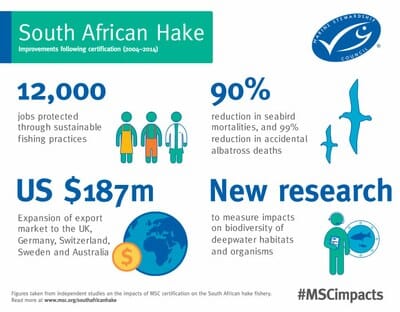At the same time, improved fishing practices have led to major environmental improvements such as a 90 per cent decline in seabird mortalities, the preservation of natural refuges for hake and better cooperation between government managers, scientists and the fishing industry.

Protecting the fishing economy and opening up new markets
The South African hake fishery employs over 8,000 men and women and is responsible for export revenue of around US$ 187 million a year. Two independent economic studies by fisheries consulting group, OLRAC, and the Bureau of Economic Research (BER) indicate that certification has helped to create opportunities for diversification to non-traditional markets such as the UK, Germany, Switzerland, Sweden and Australia, where buyer commitments to sustainable sourcing have often been the driver.
The results showed that without certification the Net Present Value (NPV) of South Africa’s hake trawl fishery could decrease by an estimated 35 per cent over a 5-year period. The resultant loss in the fishery’s contribution to GDP would be between 28–47 per cent, with the potential loss of 12,000 jobs in the fisheries sector and supporting industries.
Secretary of the South African Deep-Sea Trawling Industry Association (SADSTIA), Roy Bross, commented: “The fishing industry is certainly aware of the market benefits that have resulted from MSC certification. We are also very proud of the environmental improvements we’ve made. Being able to demonstrate our work through MSC certification means that we can ultimately pass the market rewards throughout the entire trawling family."
Reducing seabird mortalities
The SA hake fishery has also seen some significant environmental improvements as a result of conditions set at certification. This includes the introduction of bird-scaring lines. According to a recent seven-year study by BirdLife South Africa this practice has resulted in a 90 per cent reduction in seabird mortalities, and up to a 99 per cent reduction in accidental albatross deaths in South Africa’s hake trawl fishery.
This astonishing conservation success story can be traced back to when the fishery was first certified in 2004. A condition on the certification led to the discovery that each year around 10,000 seabirds (70 per cent of which were albatrosses) were being killed accidentally. BirdLife South Africa recommended the use of bird-scaring lines, to address this problem, and in collaboration with the fishing industry, and with support from the government, conducted scientific research into the effectiveness of this measure.
Bronwyn Maree, who leads the Albatross Task Force of BirdLife South Africa says: “We’ve worked closely with the certified fishery to demonstrate that avoiding seabird by-catch is good for the environment and good for business. MSC certification has certainly been instrumental in the successes we’ve seen.”
Bronwyn recently received recognition for her work on seabird conservation by being named one of the recipients of the prestigious, 2014 Future for Nature (FFN) international award.
Protecting ecosystems
Another major environmental benefit that certification has brought is the ongoing research into the impacts of the fishery on habitats and other bottom-dwelling species.
As one of the improvements required to maintain MSC certification, SADSTIA initiated research that used the best available data to chart the trawling grounds, including historically intensively trawled areas. This information has been used to "ring fence" the trawl grounds to prevent damage to lightly trawled areas and to preserve natural refuges for hake.
Pioneering research is also being conducted in the Atlantic Ocean, 100 nautical miles off the west coast of South Africa, where the trawl industry have agreed to stop fishing in certain areas for a period of at least four years to monitor ecosystem recovery in areas of closure. The Benthic Trawl Experiment is a joint initiative between the fishing industry, the South African Environmental Observation Network (SAEON), the University of Cape Town (UCT), the South African National Biodiversity Institute (SANBI) and the Department of Agriculture, Forestry and Fisheries (DAFF). It further highlights the collaborative approach being taken by the fishing industry to improve their environmental impacts and meet certification conditions.
SAEON's Lara Atkinson, who is managing the project, says: "MSC certification has helped to foster a spirit of cooperation between the different role players to get this experiment under way. We’re very excited about this opportunity to be able to monitor changes in the benthic communities in the areas where trawling has stopped."
Delivering ongoing change
Certification also has process benefits. In South Africa it has contributed to closer cooperation between scientists, non-governmental organisations (NGOs) and industry, in pursuit of responsible ecosystem-based management of fisheries. A recent study by some of the leading marine scientists in South Africa, published in The Journal of Fish Biology, found that the conditions attached to MSC certification have led to increased ecosystem research and mitigation. This included addressing challenges facing this sector. Examples include research into the effect of trawling on bottom habitats, seabird bycatch, finfish by-catch and aspects of stock assessment.
Martin Purves, MSC Southern African Programme Manager, commented: “The MSC’s vision is for the world’s oceans to be teeming with life – today, tomorrow, and for generations to come.
“This fishery clearly demonstrates what the MSC’s Theory of Change is all about. Responsible fishermen should be rewarded and see the economic benefits of their conservation efforts in the market place. On the other hand, environmental improvements should be evident and lead to long-term sustainability of certified fisheries. Collaboration between the fishing industry, scientists, government agencies and NGOs to find solutions has led to huge environmental gains in this fishery in a relatively short period of time.”




